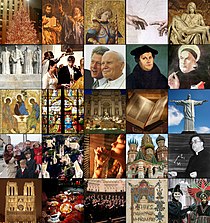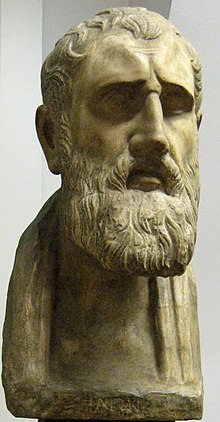Hellenistic philosophy and Christianity refers to the complex interaction between Hellenistic philosophy and early Christianity during the first to fourth centuries.
The conflict between the two modes of thought is recorded in Paul's encounters with Epicurean and Stoic philosophers in Acts 17:18, his diatribe against Greek philosophy in 1Corinthians 1:18-31 and his warning against philosophy in Colossians 2:8. However, as Christianity spread throughout the Hellenic world, an increasing number of church leaders were educated in Greek philosophy. The dominant philosophical traditions of the Greco-Roman world at the time were Stoicism, Platonism, and Epicureanism. Stoicism and particularly Platonism were readily incorporated into Christian ethics and Christian theology.
Christian assimilation of Hellenic philosophy was anticipated by Philo and other Greek-speaking Alexandrian Jews. Philo's blend of Judaism, Platonism, and Stoicism strongly influenced Christian Alexandrian writers like Origen and Clement of Alexandria, as well as, in the Latin world, Ambrose of Milan.
One early Christian writer of the 2nd and early 3rd century, Clement of Alexandria, demonstrated Greek thought in writing,
"Philosophy has been given to the Greeks as their own kind of Covenant, their foundation for the philosophy of Christ ... the philosophy of the Greeks ... contains the basic elements of that genuine and perfect knowledge which is higher than human ... even upon those spiritual objects." (Miscellanies 6. 8)
The Church historian Eusebius suggested, essentially, in his preparation for the Gospel that Greek philosophy, although in his view derivative, was concordant with Hebrew notions. Augustine of Hippo, who ultimately systematized Christian philosophy, wrote in the 4th and early 5th century,
But when I read those books of the Platonists I was taught by them to seek incorporeal truth, so I saw your 'invisible things, understood by the things that are made' (Confessions 7. 20).
Conception of God
It was not until the fusion of Platonic and Aristotelian theology with Christianity that the concepts of strict omnipotence, omniscience, or benevolence became commonplace. The Platonic Theory of Forms had an enormous influence on Hellenic Christian views of God. In those philosophies, Forms were the ideals of every object in the physical world, and objects in the physical world were merely shadows of those perfect forms. Platonic philosophers were able to theorize about the forms by looking at objects in the material world, and imagining what the "Perfect" tree, or "Perfect" man would be. The Aristotelian view of God grew from these Platonic roots, arguing that God was the Infinite, or the Unmoved mover.
Hellenic Christians and their medieval successors then applied this Form-based philosophy to the Christian God. Philosophers took all the things that they considered good, Power, Love, Knowledge and Size, and posited that God was "infinite" in all these respects. They then concluded that God was omnipotent, omniscient, omnipresent and omnibenevolent. Since God was perfect, any change would make him less than perfect, so they asserted that God was unchanging, or immutable.
Anselm of Canterbury, a priest, monk, and philosopher defined God as the "Being than which no greater can be conceived." Almost 200 years later, Thomas Aquinas, in his Summa Theologiae, article 3, wrote succinctly: "By 'God', however, we mean some infinite good".
With the establishment of the formal church, the development of creeds and formal theology, this view of God as Omni-Everything became nearly universal in the Christian World.
The ontological argument

Anselm of Canterbury composed the ontological argument for the existence of God, which he believed to be irrefutable. In essence, he argued that because God is by definition the being than which no greater can be conceived, and it is more perfect to exist than not to exist, that conceiving God not to exist was not conceiving God at all â€" it was conceiving a being less than perfect, which would not be God. Therefore, the argument proceeded, God could not be conceived not to exist.
The ontological argument is a defining example of the fusion of Hebrew and Greek thought. Philosophical realism was the dominant philosophical school of Anselm's day, and stemmed from Platonism. According to Realism, and in contrast to Nominalism, things such as "green" and "big" were known as universals, which had a real existence in an abstract realm, as described by Plato. Accordingly, if a concept could be formed in the human mind, then it had a real existence in the abstract realm of the universals, apart from his imagination. In essence, if he could imagine God, God existed.
The ontological argument reflected the classical concept of "perfections". Size, intelligence, beauty, power, benevolence, and so forth â€" all these qualities are called perfections. What is more intelligent is more perfect as regards intelligence; what is more beautiful is more perfect as regards beauty; and so forth. Because existence was more perfect than non-existence, and God was by definition perfect, God existed by definition.
Hebrew thought, however, contains no reference to such presuppositions. The Platonic concepts of realism, perfections, and a God defined as infinite. This became incorporated into Greek medieval philosophy.
Modern debate
Recently, a great deal of debate has arisen regarding the influence of Platonic thought on Christian thought. Movements such as Open theism and Process theology have argued that the God of the Jews and non-Hellenized Christians was not changeless in every respect, while Process theology has gone so far as to deny the classical attribute of God's omnipotence. In support of their position(s), Open Theists cite numerous biblical passages, and both Open Theists and Process Theologians cite the problem of evil and the problem of prayer, which they believe make the existence of a changeless and (for process theologians) omnipotent God, logically untenable.
See also

- Constantinian shift
- Hellenistic Judaism
- Jesus Christ the Logos
- Judaism and Christianity
- Neoplatonism and Christianity
- Neoplatonism and Gnosticism
- Pseudo-Dionysius the Areopagite
- Religio licita
References

Further reading

- Daniel W. Graham and James L. Siebach, "Philosophy and Early Christianity," 210-220.
- Cook, "How Deep the Platonism," 269-286 in Farms Review of Books, vol. 11, no. 2 (1999).
- Hebrew, Early Judaic, and Early Christian Thought
External links
- Christian Platonists and Neoplatonists
